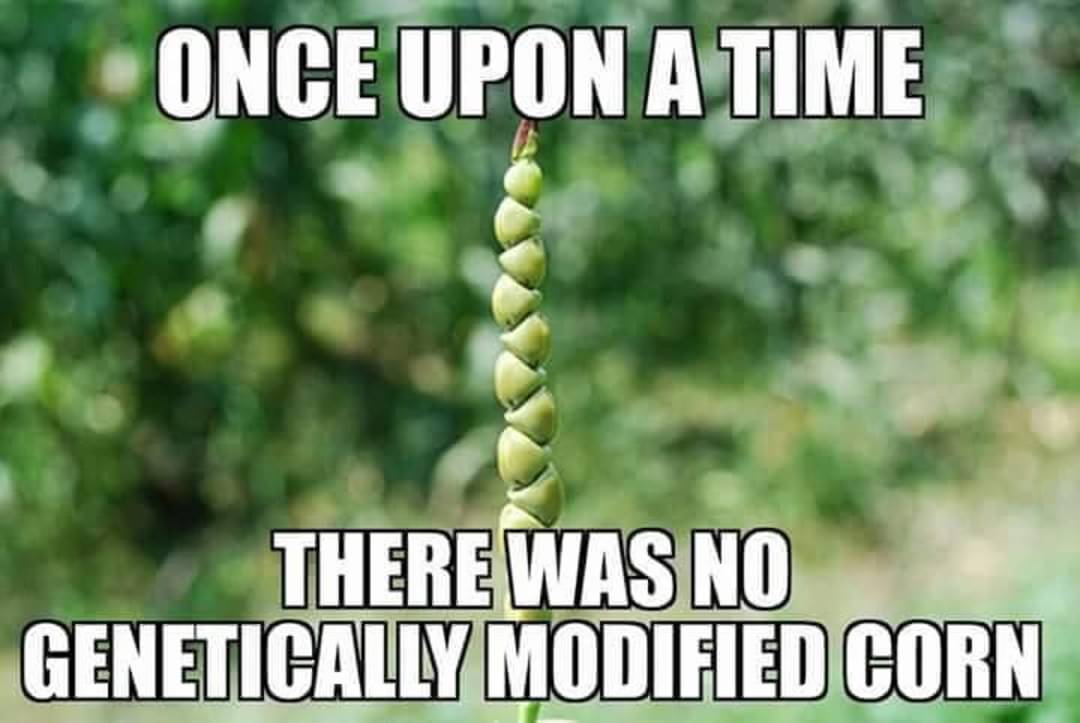Thats a teosinte seed; teosinte is the grass ancestor of corn that still grows in Mexico.
Science Memes
Welcome to c/science_memes @ Mander.xyz!
A place for majestic STEMLORD peacocking, as well as memes about the realities of working in a lab.

Rules
- Don't throw mud. Behave like an intellectual and remember the human.
- Keep it rooted (on topic).
- No spam.
- Infographics welcome, get schooled.
Research Committee
Other Mander Communities
Science and Research
Biology and Life Sciences
- [email protected]
- [email protected]
- [email protected]
- [email protected]
- [email protected]
- [email protected]
- [email protected]
- [email protected]
- [email protected]
- [email protected]
- [email protected]
- [email protected]
- [email protected]
- [email protected]
- [email protected]
- [email protected]
- [email protected]
- [email protected]
- [email protected]
- [email protected]
- [email protected]
- [email protected]
- [email protected]
- [email protected]
- !reptiles and [email protected]
Physical Sciences
- [email protected]
- [email protected]
- [email protected]
- [email protected]
- [email protected]
- [email protected]
- [email protected]
- [email protected]
- [email protected]
Humanities and Social Sciences
Practical and Applied Sciences
- !exercise-and [email protected]
- [email protected]
- !self [email protected]
- [email protected]
- [email protected]
- [email protected]
Memes
Miscellaneous
TIL
So its the corn that is genetically modified.
Ancestor is not the same as non GMO. One could say that primates in Madagascar are ancestors to human. But there's no human population that is either GMO or went through the process of selective breeding.
Indeed.
Back then you would get 5 popcorn per bucket at the movies.
Gregor Mendel entered the chat ...
"You again! Ya filthy pea fondler!!"
And I will fondle yours too, give them here!
Mushy peas are best as a side dish, so make sure to take them to dinner first.
"Aww, my little sweatpea!"
Not sure what this is trying to say, but this seems to conflate genetic modification with selective breeding!
Selective breeding is a form of genetic modification. That’s what it’s trying to say.
By the individual definitions of the words, yes. However in actual use, genetically modified means modification through direct methods such as chemical agents, enzymes, or electroporation.
Edit:
This isn't my opinion. Here is an article in Nature: https://www.nature.com/scitable/topicpage/genetically-modified-organisms-gmos-transgenic-crops-and-732/
You can selectively breed rabbits for 1000 years and not get a glow in the dark rabbit that can be made in a week in a lab.
https://www.google.com/amp/s/amp.theguardian.com/world/2013/aug/13/glow-in-dark-rabbits-scientists
Sure, but you could selectively breed rabbits for 1,000,000 years and get a glow in the dark rabbit; GFP is just a protein like any other - if you painstakingly selectively breed for a specific DNA sequence, you'll eventually get it regardless of your starting genetic pool. Classic selective breeding is a form of genetic modification - modern genetic modification methods are just way faster.
I agree that we don't currently know enough about genetics to utilize genetic modification without unforeseen side effects, and so there should be limitations on what we're able to genetically modify until we can show that we understand it well enough to meaningfully minimize potential issues, but those same issues occur with selective breeding - they're, again, just slower.
That's all beside the point that actual scientists use GMO to mean directly genetically modified and not selective breeding.
The speed of a technology is a substantial difference.
Claiming selective breeding is GMO because they are both artificial genetic modifications is like saying a horse and an Boeing 747 are both just transportation.
a horse and an Boeing 747 are both just transportation.
But… they are.
And like GM technically including selective breeding if you look at the words individually, no one would confuse getting their New York MTA pass as including horse rides even though Transportation is the T in MTA. Actual scientists use GM to mean methods other than natural or selective breeding.
Thanks to capitalism however we can re buy the seed every season and insure Monsantos earnings please the shareholders
the problem isn't that GMOs exist it's that all GMOs that exist are either sprayed with 10x pesticide or are GM'd to make their own super potent pesticide
Golden rice does neither of these two things. Not that the facts matter when it comes to our irrational fear of gmos.
You may not like it but this is what peak corn looks like
Which person decided to domesticate that thing. Just like "hey I found this weird looking grass fruit wanna enslave it" and chief's like "hell yeah of course I wanna enslave it!" and then they just ate increasingly beady grass for a few thousand years
They just realized it was edible, thought to save some to plant, and then the big idea was whenever they realized they should save the biggest ones to replant
Wrong, the grass enslaved humanity. It was like "I hear wheat is doing well, I wanna get a hominid slave species that will protect me from pests and propagate my genetic line whilst literally clearing away all competing plants for miles."
And corn got their slaves, and as the plant relaxed over successive generations they grew more bready and delicious because the only predator eating them was also ensuring their monocrop dominance so get fat and whatever who cares!
You need to stop, you’re too corny for anyone too like you, and honestly when you showed everyone cream corn at the family gathering it was not what anyone wanted to see, and really pop corn? Nobody should ever want pop corn. Anyway if you really like corn you can have it at home, but not while we’re eating out.
We should recognize the tremendous efforts of prehistoric American botanists for selectively breeding so many major food crops. Maize, tomatoes, peppers, potatoes, squash, beans, avocado, cacao, peanuts, papaya, and pineapples are among the many crops first developed in pre-1492 America.
Do people use breed and generically modify interchangeably? Are they actually the same
Selective breeding is a way to pick out the genetic traits you prefer so technically yes but it’s not how people typically use “genetically modified.”
No they are not the same. GMO is defined as using genetic engineering to modify an organism. Breeding, or recombination, does not qualify as GMO. But I’m sure there are a lot of people that lump breeding with genetic engineering, so it’s really all in who you ask.
We get to choose the genes when genetically modifying, and it usually takes a few years (plus health metrics and research once complete).
Contrary, when selectively breeding we can breed for traits which we are not guaranteed to actually get, and it takes a few decades (plus health metrics and research once complete).
when selectively breeding we can breed for traits which we are not guaranteed to actually get, and it takes a few decades (plus health metrics and research once complete).
Nobody will make you confirm your randomly bred variant is actually healthy, or even non-harmful, and you can sell it without publishing a thing.

Hard core corn
Hell yeah, teosinte gang rise up (to a rather modest population size).
Country girls made do.
